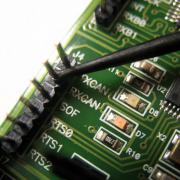We're happy to announce the new libsigrokdecode 0.1.1 release!
You can download the source tarball from SourceForge, as usual.
This is mostly a bugfix-release, the C library API was not changed. This means existing frontends that work with / are linked against libsigrokdecode 0.1.0 (e.g. sigrok-cli 0.3.1) will continue to work just fine, without requiring relinking or recompiling.
However, some of the protocol decoders' output changed in ways which are not compatible with the state of the decoders in the last libsigrokdecode release. This means, if you're using any scripts to parse sigrok-cli decoder output, or if you have any "private" protocol decoders that stack on top of one of those shipped with libsigrokdecode, you will have to do some adaptations. You're also encouraged to submit such decoders to be included in libsigrokdecode proper, of course!
In addition to all kinds of improvements and bugfixes in existing protocol decoders (PDs), you're probably most interested in what new protocol decoders are now supported. So here's the list:
This adds up to currently 29 supported PDs. The decoders are in various stages of "feature completeness", of course. Additional improvements and more verbose/complete decoding functionality will be added over time.
You can use some example files we've collected in the sigrok-dumps repository to test the protocol decoders. For example, the CAN decoder:
$ sigrok-cli -i mcp2515dm-bm-1mbits_msg_222_5bytes.sr -a can:can_rx=2
can: "Start of frame" "SOF"
can: "ID: 0 (0x0)"
can: "IDE: standard frame"
can: "RB0: 0"
can: "RTR: data frame"
can: "Stuff bit: 1"
can: "DLC: 7"
can: "Stuff bit: 0"
can: "Stuff bit: 1"
can: "Stuff bit: 0"
can: "Data byte 0: 0xf0"
can: "Data byte 1: 0x00"
[...]
Or, the basic JTAG decoder:
$ sigrok-cli -i olimex_stm32-h103_irscan_drscan.sr -a jtag:trst=0:tdi=1:tms=2:tck=3:tdo=4
jtag: "New state: SELECT-DR-SCAN"
jtag: "New state: SELECT-IR-SCAN"
jtag: "New state: CAPTURE-IR"
jtag: "New state: SHIFT-IR"
[...]
jtag: "New state: SHIFT-IR"
jtag: "New state: EXIT1-IR"
jtag: "IR TDI: 11111110 (0xfe), 8 bits"
jtag: "IR TDO: 11110001 (0xf1), 8 bits"
jtag: "New state: UPDATE-IR"
Or, stacking the STM32-specific JTAG protocol decoder on top of the JTAG decoder:
$ sigrok-cli -i olimex_stm32-h103_irscan_drscan.sr \
-a jtag:trst=0:tdi=1:tms=2:tck=3:tdo=4,jtag_stm32 -s jtag,jtag_stm32
jtag_stm32: "IR: IDCODE"
jtag_stm32: "IDCODE: 0x3ba00477 (ver=0x3, part=0xba00, manuf=0x23b, res=0x1)"
If you want to contribute any additional sample files for various protocols (*.sr format as produced by sigrok-cli) for our sigrok-dumps repository that would be great!
We're also currently in the process of adding a wiki page for every protocol decoder, with detailed information about the protocol it decodes, the decoder implementation and its status, how to use it, which decoders it stacks on (or which ones can stack on top of it), and so on. Check the pages for mx25lxx05d, dcf77, or nunchuk, for some (work in progress) examples.
Please check the libsigrokdecode NEWS file for the full list of user-visible changes in this release. As always, we're happy about bug reports, feature suggestions, comments about which protocol decoders you'd want supported next, or even better — patches :)